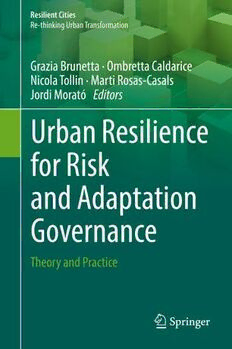
Urban Resilience for Risk and Adaptation Governance PDF
305 Pages·2019·9.831 MB·English
Most books are stored in the elastic cloud where traffic is expensive. For this reason, we have a limit on daily download.
Preview Urban Resilience for Risk and Adaptation Governance
Description:
This book brings together a series of theory and practice essays on risk management and adaptation in urban contexts within a resilient and multidimensional perspective. The book proposes a transversal approach with regard to the role of spatial planning in promoting and fostering risk management as well as institutions’ challenges for governing risk, particularly in relation to new forms of multi-level governance that may include stakeholders and citizen engagement. The different contributions focus on approaches, policies, and practices able to contrast risks in urban systems generating social inclusion, equity and participation through bottom-up governance forms and co-evolution principles. Case studies focus on lessons learned, as well as the potential and means for their replication and upscaling, also through capacity building and knowledge transfer. Among many other topics, the book explores difficulties encountered in, and creative solutions found, community and local experiences and capacities, organizational processes and integrative institutional, technical approaches to risk issue in cities.
See more
The list of books you might like
Most books are stored in the elastic cloud where traffic is expensive. For this reason, we have a limit on daily download.
